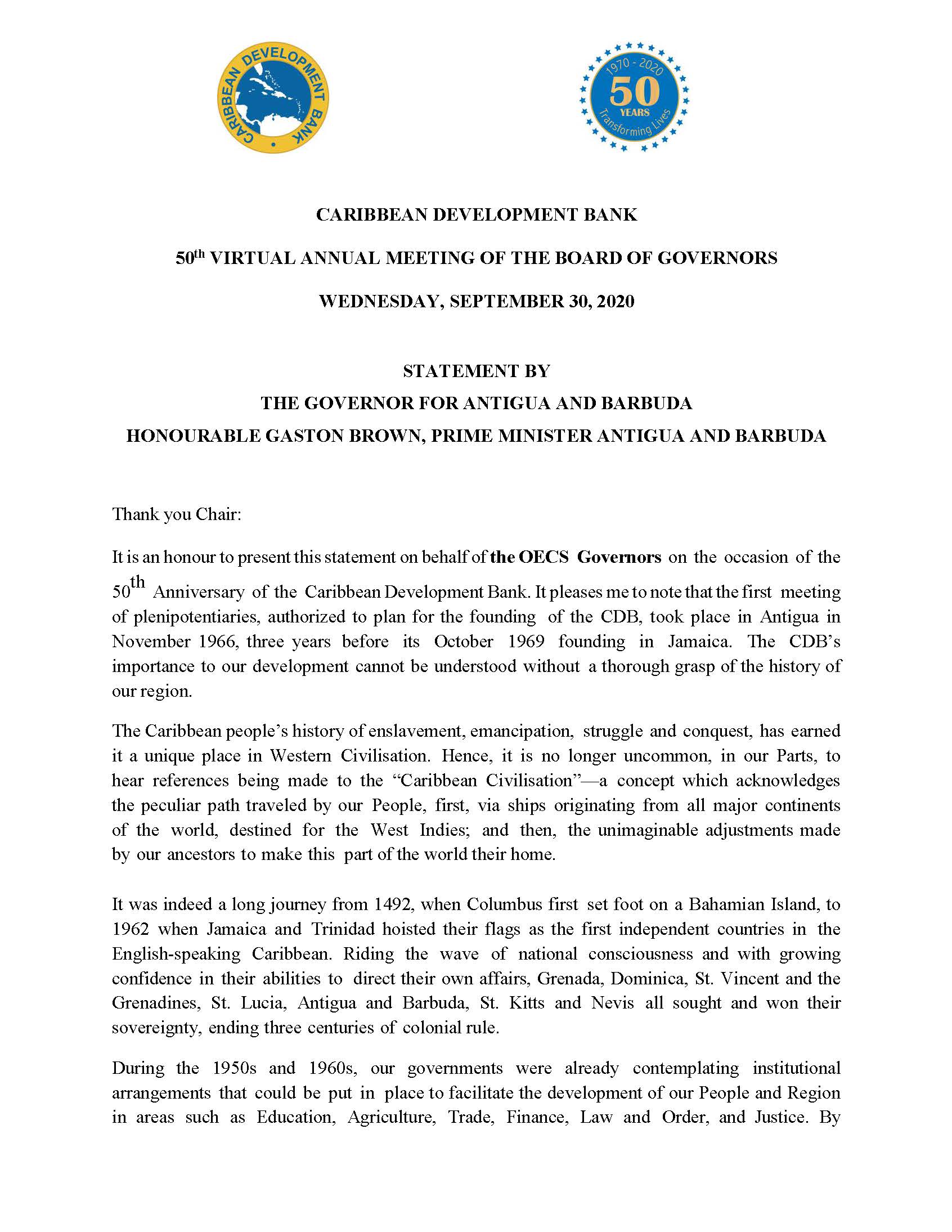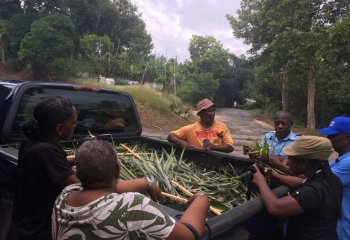
It is an honour to present this statement on behalf of the OECS Governors on the occasion of the 50th Anniversary of the Caribbean Development Bank. It pleases me to note that the first meeting of plenipotentiaries, authorized to plan for the founding of the CDB, took place in Antigua in November 1966, three years before its October 1969 founding in Jamaica. The CDB’s importance to our development cannot be understood without a thorough grasp of the history of our region.
The Caribbean people’s history of enslavement, emancipation, struggle and conquest, has earned it a unique place in Western Civilisation. Hence, it is no longer uncommon, in our Parts, to hear references being made to the “Caribbean Civilisation”—a concept which acknowledges the peculiar path traveled by our People, first, via ships originating from all major continents of the world, destined for the West Indies; and then, the unimaginable adjustments made by our ancestors to make this part of the world their home.
It was indeed a long journey from 1492, when Columbus first set foot on a Bahamian Island, to 1962 when Jamaica and Trinidad hoisted their flags as the first independent countries in the English-speaking Caribbean. Riding the wave of national consciousness and with growing confidence in their abilities to direct their own affairs, Grenada, Dominica, St. Vincent and the Grenadines, St. Lucia, Antigua and Barbuda, St. Kitts and Nevis all sought and won their sovereignty, ending three centuries of colonial rule.
During the 1950s and 1960s, our governments were already contemplating institutional arrangements that could be put in place to facilitate the development of our People and Region in areas such as Education, Agriculture, Trade, Finance, Law and Order, and Justice. By 1960, all Anglo-Caribbean countries had secured adult suffrage, which conferred upon adults the right to vote, irrespective of income and social status; and which focused our collective minds on the concept of citizenship and its responsibilities. By this time we were openly unaccepting of social injustice, racial inequality and wide economic disparity; workers’ rights were being championed; and these issues were being unabashedly discussed among an increasingly confident, organised and emboldened Citizenry.
It is no surprise, therefore, that the dynamic early decades of the 20th Century served as the crucible that produced scholars of global renown, artistes and athletes of international acclaim, and institutions that could hold their own amongst the best in the world: Sir Arthur William Lewis, Sir Vere Cornwall Bird and Sir Lewellyn Bradshaw; Sir Isaac Vivian Alexander Richards; the University of the West Indies (UWI) and the Caribbean Development Bank (CDB), to name a few bright stars in the Caribbean constellation.
The CDB was the right institution, created at the right time, to help bridge the harsh realities facing Caribbean people, with their aspirations for more equitable social and economic participation in their Caribbean space. The West Indies Federation did not achieve its goals; but, we were far from giving up on the notion of “community”. We were:
“One race (de Caribbean man)
From de same place (de Caribbean man)
Dat make de same trip (de Caribbean man)
On de same ship (de Caribbean man)” (Leroy Calliste, aka Black Stalin)
By way of an agreement signed in Jamaica in October 1969, the Caribbean Development Bank came into being in January 1970. The Article of Agreement which captures its raison d’etre states:
“The purpose of the Bank shall be to contribute to the harmonious economic growth and development of the member countries in the Caribbean (hereinafter called the “region”) and to promote economic co-operation and integration among them, having special and urgent regard to the needs of the less developed members in the region.”
As a member of the OECS, Antigua and Barbuda can certainly attest to the faithfulness of the CDB to its purpose, particularly as it relates to the “less developed members” of the Bank.
I can speak authoritatively, for example, on the CDB’s role in resolving the financial sector stability issues which had threatened a decade ago to undermine the banking sector in Antigua and Barbuda and the remaining members of the Eastern Caribbean Currency Union.
I also recall the CDB’s multiple interventions to save LIAT which kept in place a critical air-bridge between our countries.
I will finally mention the dependable support of the Bank at those times when nature had not been benevolent to us and we were ravaged, primarily by hurricanes. The relief offered by the CDB was always quick in coming and “life saving”.
In this regard, President Dr. William Smith has taken the Caribbean Development Bank to new heights, standing tall on the shoulders of past presidents:
Dr. Compton Bourne
Sir Neville Nicholls
Mr. William Demas; and
Sir William Arthur Lewis,
… a pantheon of great scholars and thinkers, whose respective contributions helped chisel and shape Caribbean values, Caribbean society and ultimately Caribbean Civilisation.
Dr. Smith, who joined this exclusive club in 2011 as CDB’s fifth president, must be credited with further raising the profile of the Bank and widening its sphere of influence. Not only has the Bank’s balance sheet acquired more heft, but the membership of the bank has been expanded, with discussions for further expansion ongoing. Under Dr. Smith’s stewardship and leadership, the CDB has become a critical member of a much larger network of institutions, thereby leveraging its position to more effectively fulfill its purpose.
Under his watchful eye, the Bank’s credit rating was maintained at the highest levels, thus earning it the respect of credit agencies, the acclaim of shareholders and the confidence of investors. He also sold his vision for increased vigilance and discipline in the management of risk at the Bank and piloted the implementation and institutionalization of the Office of Risk Management. Moreover, the use of policy-based operations, which provided critical financing to Borrowing Member Countries, within the context of policy enhancing reforms, will be a signature of his presidency.
Much of the recent success of the Bank can be attributed to Dr. Smith’s leadership qualities and personal traits, a number of which were honed and perfected during his sojourn in Antigua and Barbuda, when he was chief executive officer of LIAT.
- He is at ease with Royalty, no less than he is with Joe Blow from St. John’s ;
- He is disarmingly honest and wins the trust of colleagues;
- He pursues opportunities without being opportunistic;
- He appreciates the simple and the ordinary but just as easily mulls over complex financial models;
- He really does love people and in particular Caribbean People; and
- Last but not least, he knows how to throw a decent Christmas party, featuring the finest of Caribbean rums.
Save for his penchant for throwing a good party, the above traits no doubt helped to cement the United Kingdom’s confidence in Dr. Smith’s leadership when it selected CDB to manage the implementation of the £300 million UKCIF programme, one of the flagship development interventions since the inception of the Bank.
As we celebrate this champagne moment, CDB’s fiftieth birthday, we look back with pride at an institution that has been at the heart of Caribbean development, wearing its many hats:
Thought leader - in development discourse;
First responder - in times of disaster;
Policy adviser - to Caribbean governments;
Financier - for development projects;
Advocate - for gender sensitive approaches and inclusive growth;
Evangelist - proclaiming the gospel of Resilience;
Emissary - ensuring that Caribbean voices are heard and reinforced worldwide; and
Cultural Ambassador - promoting and showcasing the best of Caribbean traditions.
But whilst we raise our flutes in celebration of the last fifty years, let us also consider the next fifty. The Caribbean remains one of the most vulnerable regions in the world. It is a testament to our People’s ability to adapt, determination to succeed and strength of will to survive, that we have achieved impressive levels of human and economic development. Our challenge is to sustain those levels and to enhance them in an environment that is hostile.
The COVID-19 pandemic has placed into sharp relief our countries’ smallness; our openness; and our indebtedness. Resolving these challenges will be critical in ensuring the survival of our Caribbean Civilisation; and in this endeavour, CDB has an important role to play.
How do we overcome our smallness? We overcome our smallness through aggregation and integration. How can CDB effectively catalyse the integration process?
How do we overcome our openness? We overcome our openness by mainstreaming Resilience into our economies and societies. How can CDB energise this undertaking?
How do we overcome our indebtedness? We overcome our indebtedness by growing our economies. What innovative ideas could CDB apply towards our accomplishing this feat?
The above are but a few of the high-level developmental challenges that are going to demand the logistical expertise, the financial resources and the intellectual capital of the CDB over the next fifty years.
As I come to the end, I wish to applaud the Bank on yet another commendable performance for fiscal year, 2019. We note that whilst Approvals for the year under review, totaling $297.0 million, were slightly down from last year, total Disbursements recorded at $293.1 million, were marginally up.
We are pleased to note that with respect to the UKCIF projects, Approvals were up by almost 22.6% with Disbursements also increasing by approximately 77.5%. This is a particularly welcome outturn that is indicative of the increased traction gained in respect of the UKCIF projects.
In terms of the bottom line, operating income for 2019 stood at $24.6 million, representing a 75.9% positive change in relation to 2018.
We wish to congratulate the Bank on the astute management of its finances and on its consistency in achieving positive results.
In closing, on behalf of the governors of the OECS, I thank Dr. Warren Smith for his tremendous contribution to the Bank and to our Region. We wish him God’s blessings. He has indeed done us proud as President, but more importantly as a Caribbean Man and a shining star in the Caribbean constellation.
To the next President, we wish him or her every success and pledge our unqualified support as you shoulder the weighty responsibilities of the Presidency, being patently aware of the importance of this august institution in determining the trajectory of our Caribbean Civilisation.
Finally, to all crew members on board this Caribbean Enterprise, God’s blessings!
Thank you Chair.

